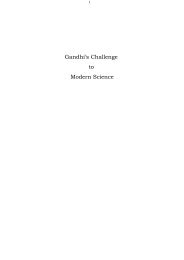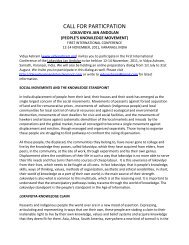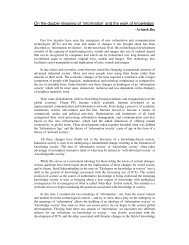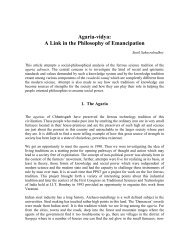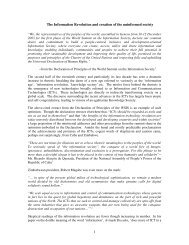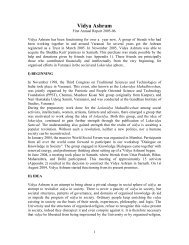Dialogues on knowledge in Society Dialogues on ... - Vidya Ashram
Dialogues on knowledge in Society Dialogues on ... - Vidya Ashram
Dialogues on knowledge in Society Dialogues on ... - Vidya Ashram
Create successful ePaper yourself
Turn your PDF publications into a flip-book with our unique Google optimized e-Paper software.
<str<strong>on</strong>g>Dialogues</str<strong>on</strong>g> <strong>on</strong> <strong>knowledge</strong> <strong>in</strong> <strong>Society</strong><br />
Sunil Sahasrabudhey<br />
The sweep<strong>in</strong>g changes occurr<strong>in</strong>g <strong>in</strong> society seem to demand a fresh and radical return to<br />
the first pr<strong>in</strong>ciples today. The human engagement must grapple aga<strong>in</strong> with the fundamental<br />
questi<strong>on</strong> of where lies the strength of the people. <str<strong>on</strong>g>Dialogues</str<strong>on</strong>g> such as these may be expected to<br />
c<strong>on</strong>tribute to the logic of this rediscovery. A first stretch of thoughts is given below to start a<br />
discussi<strong>on</strong>.<br />
<str<strong>on</strong>g>Dialogues</str<strong>on</strong>g> <strong>on</strong> <strong>knowledge</strong> <strong>in</strong> society<br />
It is an explorati<strong>on</strong> of the place of <strong>knowledge</strong>, its role, functi<strong>on</strong>, c<strong>on</strong>tent, organizati<strong>on</strong>,<br />
methods of producti<strong>on</strong> and communicati<strong>on</strong> etc and its relati<strong>on</strong>ship with everyth<strong>in</strong>g that there<br />
is both <strong>in</strong> the world of thought and <strong>in</strong> the material world.<br />
<strong>Society</strong><br />
The modern society has been divided <strong>in</strong>to two worlds named differently by different<br />
ideological pursuits. Some of the names are rich and poor, West and East, Center and<br />
periphery, <strong>in</strong>dustrial and n<strong>on</strong>-<strong>in</strong>dustrial, capitalist and pre-capitalist, imperial and col<strong>on</strong>ial etc.<br />
The emergence of Informati<strong>on</strong> and Communicati<strong>on</strong> Technologies (ICT) has given birth to a<br />
further new language perhaps reflect<strong>in</strong>g a new reality, the two worlds now be<strong>in</strong>g those of<br />
netizens and citizens or the net society and the civil society.<br />
Discussi<strong>on</strong> of <strong>knowledge</strong> <strong>in</strong> society seems to require liberati<strong>on</strong> from the framework of<br />
the <strong>in</strong>dustrial society and development of new paradigms <strong>in</strong> accordance with the emerg<strong>in</strong>g<br />
realities of the <strong>knowledge</strong> society.<br />
Explorati<strong>on</strong><br />
S<strong>in</strong>ce we are at a transiti<strong>on</strong> from the <strong>in</strong>dustrial to <strong>knowledge</strong> society and not <strong>on</strong>ly that it<br />
is not known what future holds <strong>in</strong> store for the human k<strong>in</strong>d but that future is a matter of what<br />
and how men and women build it, def<strong>in</strong>e it, imag<strong>in</strong>e it and actually shape it, therefore the<br />
explorati<strong>on</strong> <strong>in</strong> the sphere of <strong>knowledge</strong>, the dialogues themselves must c<strong>on</strong>stitute a mode of<br />
transcendence, a method of <strong>in</strong>cessant boot<strong>in</strong>g theoretically. This is to say that the explorati<strong>on</strong><br />
is not towards a known ideal but itself c<strong>on</strong>stitutes an ideal dynamic. It is not to build theories<br />
of present and future but to assist <strong>in</strong>dividual, collective, social etc. transcendence from <strong>on</strong>e's<br />
own theoretical c<strong>on</strong>structs.<br />
Science<br />
The <strong>in</strong>dustrial society created <strong>in</strong> `Science' the new God. It was, with its method, the<br />
supreme form of <strong>knowledge</strong> and also the <strong>on</strong>ly legitimate source of <strong>knowledge</strong>. It was declared<br />
value-<strong>in</strong>dependent and culture-free; these characteristics tend<strong>in</strong>g to assume the status of<br />
criteria of legitimacy, universality and even absoluteness. Method of producti<strong>on</strong> of <strong>knowledge</strong><br />
and its c<strong>on</strong>tent assumed s<strong>in</strong>gular importance. The world of the poor and the col<strong>on</strong>ised seldom<br />
mustered enough strength to questi<strong>on</strong> all these <strong>in</strong> the public doma<strong>in</strong> and therefore he<br />
developed ways of not accept<strong>in</strong>g any of this <strong>in</strong> his own world. The processes of real life still<br />
give him enough opportunity to practice his own methods and develop his <strong>knowledge</strong> further<br />
<strong>in</strong> <strong>in</strong>tegral relati<strong>on</strong>ship with his culture and his system of values. This was survival with an<br />
<strong>in</strong>tr<strong>in</strong>sic strength which would some day serve a challenge. Gandhiji was that phenomen<strong>on</strong> <strong>in</strong><br />
India.<br />
With the emergence of the <strong>knowledge</strong> society, from with<strong>in</strong> the first world itself there is a<br />
questi<strong>on</strong><strong>in</strong>g of the absoluteness of science. The characteristics of value freeness and culture
<strong>in</strong>dependence may not enjoy the same status now. Sanctity of 'the method' may go overboard<br />
<strong>in</strong> due time; producti<strong>on</strong> of <strong>knowledge</strong> is not the chief c<strong>on</strong>cern of the <strong>knowledge</strong> society. ICTs<br />
are methods of organizati<strong>on</strong> and communicati<strong>on</strong> of <strong>knowledge</strong>. It perhaps does not matter<br />
now how <strong>knowledge</strong> is produced and who produces it and the status as <strong>knowledge</strong> may be<br />
determ<strong>in</strong>ed by its organisability by ICTs. So <strong>knowledge</strong> society transforms the relati<strong>on</strong>ship of<br />
man's epistemic activities with truth. Science <strong>in</strong> the <strong>in</strong>dustrial society was imag<strong>in</strong>ed as a<br />
pursuit of truth. Knowledge related activities now have an explicit c<strong>on</strong>necti<strong>on</strong> with<br />
pragmatism. Not that <strong>in</strong>dustrial society did not have such c<strong>on</strong>necti<strong>on</strong> but then it was part of<br />
truth seek<strong>in</strong>g where as now, at least at present, it is part of management activity.<br />
Last quarters of the 20th century witnessed a method of challenge to science with a new<br />
critique based <strong>in</strong> a fresh appreciati<strong>on</strong> of the logic and c<strong>on</strong>tent of traditi<strong>on</strong>al <strong>knowledge</strong>, liv<strong>in</strong>g<br />
traditi<strong>on</strong>s of <strong>knowledge</strong> am<strong>on</strong>g peasants and artisans, the col<strong>on</strong>ized and the poor. Such basis<br />
seems now to require the <strong>in</strong>clusi<strong>on</strong> of the method of organizati<strong>on</strong> and communicati<strong>on</strong> of<br />
<strong>knowledge</strong> am<strong>on</strong>g the people which may be reflected <strong>in</strong> various <strong>in</strong>stituti<strong>on</strong>al forms and<br />
methods of struggle <strong>in</strong> the other doma<strong>in</strong>.<br />
The Shift<br />
The shift from c<strong>on</strong>tent to organizati<strong>on</strong> and producti<strong>on</strong> to communicati<strong>on</strong> has taken the<br />
world of thought by a storm. For all philosophy hitherto (from Des'carte to Popper and<br />
Chomsky) survival is at stake. The world of th<strong>in</strong>gs and forces is be<strong>in</strong>g replaced by a world of<br />
representati<strong>on</strong>, structure and mean<strong>in</strong>g. The world (<strong>on</strong>tology) of the natural sciences may<br />
become <strong>on</strong>e of the many possible worlds. The ICTs may know how to organize the<br />
<strong>knowledge</strong> c<strong>on</strong>tent of different social formati<strong>on</strong>s legitimiz<strong>in</strong>g their <strong>on</strong>tologies <strong>in</strong> the process<br />
and carry<strong>in</strong>g out an epistemic reducti<strong>on</strong>, a price that the diverse civilizati<strong>on</strong>s shall pay.<br />
<str<strong>on</strong>g>Dialogues</str<strong>on</strong>g> <strong>on</strong> <strong>knowledge</strong> <strong>in</strong> society must recognize both the new spaces that this shift creates<br />
and the epistemic reducti<strong>on</strong> that the other doma<strong>in</strong> suffers. The new spaces are structured<br />
aga<strong>in</strong>st the <strong>in</strong>dustrial society and therefore <strong>in</strong> a def<strong>in</strong>ite sense also aga<strong>in</strong>st the forms of<br />
dom<strong>in</strong>ati<strong>on</strong> <strong>in</strong> the old world. These spaces <strong>on</strong> their own are not emancipatory and are<br />
favourable to build<strong>in</strong>g new structures of dom<strong>in</strong>ati<strong>on</strong> and deprivati<strong>on</strong>. However <strong>in</strong> so far as the<br />
shift must dismantle the old world, it must provide space for organizati<strong>on</strong> and communicati<strong>on</strong><br />
of <strong>knowledge</strong> from a people's standpo<strong>in</strong>t also. <str<strong>on</strong>g>Dialogues</str<strong>on</strong>g> <strong>on</strong> <strong>knowledge</strong> <strong>in</strong> society may clearly<br />
focus <strong>on</strong> the nature and type of this space and the k<strong>in</strong>d of <strong>in</strong>itiatives that enhance the strengths<br />
of people and their capacity to wage a battle aga<strong>in</strong>st (the price of) epistemic reducti<strong>on</strong> be<strong>in</strong>g<br />
thrust up<strong>on</strong> them.<br />
Lokavidya Standpo<strong>in</strong>t<br />
What is generally referred to as people's <strong>knowledge</strong>, people's standpo<strong>in</strong>t etc. are partial<br />
ways of referr<strong>in</strong>g (prevalent <strong>in</strong> the old world) to what is a wholesome epistemic stand of the<br />
other doma<strong>in</strong>. This is the lokavidya standpo<strong>in</strong>t. Lokavidya philosophy is a comprehensive<br />
understand<strong>in</strong>g of <strong>knowledge</strong> <strong>in</strong> all its aspects, functi<strong>on</strong>s and relati<strong>on</strong>ships which is the<br />
genu<strong>in</strong>e subject matter of dialogues <strong>on</strong> <strong>knowledge</strong> <strong>in</strong> society. However given below are a few<br />
dist<strong>in</strong>ct po<strong>in</strong>ts str<strong>on</strong>gly relevant <strong>in</strong> the present discourse.<br />
Lokavidya means those methods (philosophy etc.) of organizati<strong>on</strong> and communicati<strong>on</strong> of<br />
vidya which place vidya <strong>in</strong> the midst of the people. Be<strong>in</strong>g <strong>in</strong> the midst of the people means (a)<br />
the str<strong>in</strong>gs of c<strong>on</strong>trol should be am<strong>on</strong>g the people that is <strong>in</strong> their social organisati<strong>on</strong>s, (b) the<br />
values of the other doma<strong>in</strong> should actually be the guid<strong>in</strong>g pr<strong>in</strong>ciples, (c) it must measure upto<br />
the criteria of ord<strong>in</strong>ary life and (d) ensur<strong>in</strong>g its role <strong>in</strong> the processes of c<strong>on</strong>structi<strong>on</strong> and<br />
rec<strong>on</strong>structi<strong>on</strong> of truth.<br />
Thus lokavidya provides a different mean<strong>in</strong>g to <strong>knowledge</strong> than provided by the<br />
<strong>knowledge</strong> society. It is completely opposed to the epistemic reducti<strong>on</strong> by the ICTs and<br />
further provides a wide enough aperture to comprehend the emancipatory aspects of
<strong>knowledge</strong> <strong>in</strong> the net-doma<strong>in</strong>. <str<strong>on</strong>g>Dialogues</str<strong>on</strong>g> <strong>on</strong> <strong>knowledge</strong> <strong>in</strong> society may develop tools of<br />
disaggregati<strong>on</strong> and hedg<strong>in</strong>g of <strong>knowledge</strong> <strong>in</strong> the net doma<strong>in</strong> and the doma<strong>in</strong> of ord<strong>in</strong>ary life.<br />
It can develop, with the help of lokavidya standpo<strong>in</strong>t ways of mesh<strong>in</strong>g the <strong>knowledge</strong> <strong>in</strong> the<br />
two doma<strong>in</strong>s <strong>in</strong> the <strong>in</strong>terest of human life, both c<strong>on</strong>temporary and future.<br />
Lokavidya standpo<strong>in</strong>t helps us understand people's <strong>in</strong>itiatives and possible <strong>in</strong>itiatives <strong>in</strong><br />
practically every sphere, ec<strong>on</strong>omic, social, cultural etc. Lokavidya pervades the activities that<br />
susta<strong>in</strong> a sphere of ec<strong>on</strong>omic exchange <strong>in</strong> ord<strong>in</strong>ary life, it is there <strong>in</strong> how people comb<strong>in</strong>e with<br />
their brethren to produce desired forms of solidarity, it provides the criteria for social values<br />
govern<strong>in</strong>g the cultures of people's lives and <strong>in</strong> most palpable form it is seen <strong>in</strong> the<br />
improvements and <strong>in</strong>novati<strong>on</strong>s by the people <strong>in</strong> their practice accord<strong>in</strong>g to need and based <strong>on</strong><br />
their experiences and genius.<br />
The Dialogue<br />
Drawn <strong>in</strong>to this dialogue are people who recognize, often not explicitly, the centrality<br />
today of organizati<strong>on</strong> and communicati<strong>on</strong> of <strong>knowledge</strong>, and this <strong>in</strong> both the doma<strong>in</strong>s, the<br />
net-doma<strong>in</strong> and the doma<strong>in</strong> of ord<strong>in</strong>ary life. At <strong>on</strong>e end therefore are ICTs and at the other<br />
lokavidya. These dialogues are not just theoretical or philosophical; they can be <strong>on</strong> very<br />
c<strong>on</strong>crete issues like market, solidarity am<strong>on</strong>g the people, energy, <strong>in</strong>dustry, organizati<strong>on</strong>,<br />
adm<strong>in</strong>istrati<strong>on</strong>, communicati<strong>on</strong>, educati<strong>on</strong>, health-care; <strong>in</strong> fact, <strong>on</strong> anyth<strong>in</strong>g.




